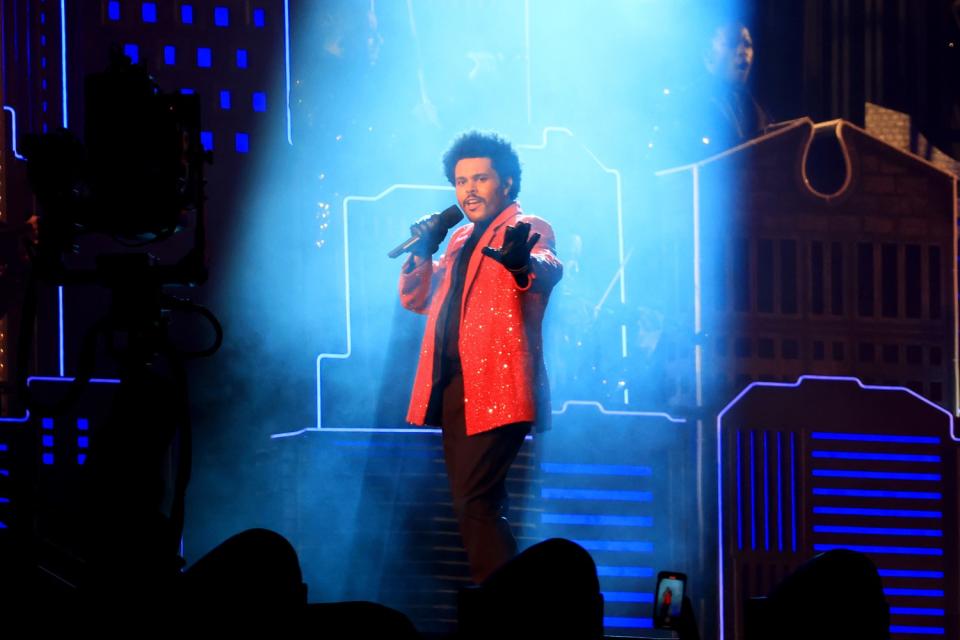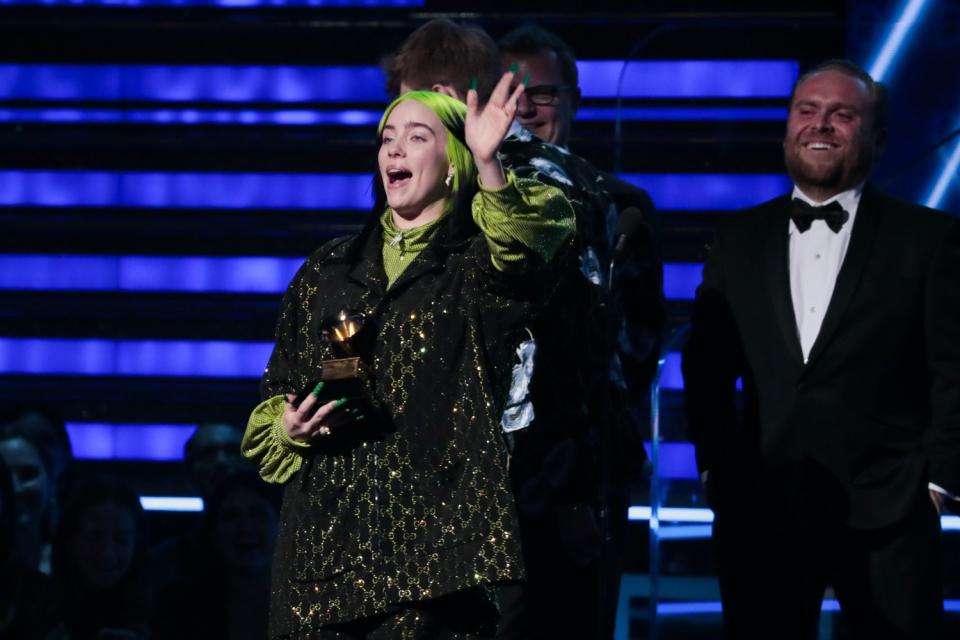Awards shows are dying. Then COVID shoveled on the dirt. Cue the 2021 Grammys!

By mid-November, Ben Winston was beginning to regret his decision to take over the Grammy Awards.
The British television producer, best known in the U.S. for turning James Corden’s “Carpool Karaoke” series into a viral sensation, had happily agreed more than a year earlier to assume control of music’s biggest awards show from Ken Ehrlich, who’d overseen it since 1980 to a mix of praise and criticism.
But that was before COVID-19 upended the music industry, not to mention the business of live TV events, just weeks after Ehrlich’s farewell edition of the ceremony in late January 2020.
Months into planning his much-hyped debut — the 63rd Grammy Awards, following a postponement from January, will finally air Sunday night on CBS — Winston, 39, was feeling bogged down by the endless logistical demands of working in a pandemic he’d never anticipated.
“How are we gonna afford this? Make this? Do this?” the executive producer recalled thinking of the show set to feature about two dozen performances by the likes of Taylor Swift, BTS, Cardi B, Harry Styles, Billie Eilish, Lil Baby and Dua Lipa. “If you’d asked me then if I was glad I took the job, I would’ve said, ‘You know what? Back to you, Ken — 41 years is what we need.’” He laughed.
“Now, if you’re asking me today, I’m delighted I’m doing it,” he said this week, grinning brightly in a video call from his office at the Television City complex in L.A.’s Fairfax District. “We’re on the edge of making something really different and unusual. And I actually like the challenge of it.”
Just then Winston’s phone chimed with an incoming text message; he looked down worriedly. “Every time I get the ding, my heart drops: What’s gone wrong?” he said. “But everything’s cool. That was from the manager of an artist. Mini-crisis averted.”

Though it will be built as always around performances and awards bestowed by the Recording Academy — Beyoncé leads nominations with nine, followed by Swift, Lipa and Roddy Ricch with six apiece — this year’s Grammys telecast won’t look much like the celebrations of the past few decades.
Instead of playing out before an audience of thousands inside the Staples Center, the show will take place on a set of five small stages arranged in a circle at the L.A. Convention Center; in an effort to minimize backstage interactions, many artists have been prerecording their performances this week, though Winston, without specifying, says some will happen live on Sunday.
And rather than having “megastar presenters handing gold statues to megastar musicians,” as the producer put it, more than half of the night’s awards will be presented by personnel from a few of the many clubs and venues that have struggled during the pandemic, including the Apollo Theater in New York and L.A.’s Troubadour and Hotel Cafe.
Winston’s goal for his first Grammys — the show, with Trevor Noah as host, will also address the growing movement for racial justice, he says — is a “deeply intimate” production in purposeful contrast with the type of spectacle in which Ehrlich specialized.
“How do you deliver a Grammy moment in the time of COVID?” asked Jack Sussman, executive vice president of specials, music and live events at CBS. “I think Ben and his team have cracked the code.”
Yet social-distancing limitations are far from the only obstacle Winston faces in his new gig, which he’s undertaking with a crew of collaborators that includes co-executive producer Raj Kapoor and director Hamish Hamilton.
For one thing, Sussman’s network is counting on him to attract millions of viewers at a time when many have burned out on virtual awards shows. Ratings for last month’s Golden Globes on NBC fell more than 60% from the 2020 ceremony, while both the American Music Awards and the Billboard Music Awards hit record lows last year. The slide isn't strictly COVID-related: The 92nd Academy Awards, which aired in all their in-person splendor in February 2020 on ABC, drew 23.6 million viewers, down from nearly 30 million in 2019. And the pre-pandemic 2020 Grammys, featuring a historic sweep of the night's four top awards by Eilish, drew its lowest ratings in history.
"Awards show are hurting the way most of linear broadcast television has been hurting," Sussman said. "Event television can still work — look at Oprah with Harry and Meghan on CBS. But is it gonna be what it was in its heyday when there were three networks? No. Nothing is."
Winston was upfront about the ratings threat, acknowledging that, regardless of the quality of his show, “the number the next morning will be down anywhere from 30 to 60% — I’m sure of it.”
“I told Ben to stop saying that,” Recording Academy interim chief executive Harvey Mason Jr. said with a laugh. “He’s bringing bad juju.”

There’s also the academy’s persistent credibility problem. Days before last year’s Grammys ceremony, the organization’s former leader, Deborah Dugan, made international headlines when she was ousted after making explosive allegations regarding discrimination, vote-rigging and financial irregularities.
The controversy brought attention to the academy’s secretive insider committees that shape Grammy nominations — attention that only increased when the Weeknd was entirely and unexpectedly overlooked for this year’s nominations for his smash “After Hours” album and his single “Blinding Lights,” which just became the first song to spend 52 weeks in the top 10 of Billboard’s Hot 100.
“The Grammys remain corrupt,” the Weeknd wrote on Twitter when nominations were announced in November. “You owe me, my fans and the industry transparency.” (In a statement to the New York Times on Thursday, the Weeknd said, “Because of the secret committees, I will no longer allow my label to submit my music to the Grammys.”)
Other artists — including many artists of color such as Drake, Frank Ocean and Sean “Diddy” Combs — have spoken out against what they say is the academy’s mishandling of hip-hop and R&B. Just this week, in a series of tweets that began “F— the grammys,” former One Direction member Zayn Malik accused the group of creating a system that “allows favoritism, racism and networking politics to influence the voting process.”
In response, the academy has introduced a number of initiatives devoted to boosting the racial and gender diversity of a membership widely thought to be dominated by older white men. In July the organization invited approximately 2,300 recording-industry professionals — half of them women and half under 40 — to join the academy; 1,722 accepted, an academy spokeswoman said.
Of the Weeknd’s shutout, Mason this week reiterated what he said in November: that there simply wasn’t enough space in the Grammys’ 84 categories to nominate all the music that deserved to be honored.
"I love his record," Mason added. "A lot of people love his record."

Yet in a demonstration of the troubled relationship between the academy and the creative community it ostensibly represents, Beyoncé, who’s up for record of the year and song of the year with “Black Parade,” isn’t on the bill for Sunday’s show — the third time in recent history (after Kendrick Lamar in 2019 and Beyoncé's husband, Jay-Z, in 2018) that the year’s most-nominated act has opted not to perform on the telecast.
“It’s unfortunate, because she’s such a big part of the Recording Academy,” Mason said of Beyoncé’s decision. “We absolutely wish we had her onstage.”
Asked whether a viewer might reasonably think it strange that Beyoncé isn’t there, Winston — who insisted he’s not planning a surprise performance by the singer nor a rumored comeback appearance by Adele — paused and said, “They might.”
The producer’s diplomatic response was an indication of his delicate position: He’s in charge of the academy’s most public presentation but not of how the organization hands out its awards.
“You know that’s the deal when you take over the show,” he said, adding that he spent the first three months after his appointment meeting with artists and label execs to hear “what they thought about the Grammys.” One unnamed performer he hoped to book this year turned him down, he said, “because she was like, ‘I got snubbed three years ago, and I’m still annoyed about it.’
“I told her, ‘Right, but you know that’s nothing to do with me?’ She said, ‘I don’t know — it sort of is, isn’t it?’”
Winston’s pitch to those with complaints was that the change they’d long been calling for at the Grammys had arrived. “So be part of something,” he said he told them.

Of course, the unique circumstances of 2020 and 2021 delivered even more change than he was promising. Winston, who beyond his work with Corden has also overseen TV projects by Bruno Mars and Kacey Musgraves, said he feels fortunate to be putting on his event after so many other awards producers “have had a go at it” amid COVID restrictions. Performers on some shows, such as the Country Music Assn. Awards, have struggled to find the needed energy minus full-sized audiences; other shows, such as the BET Awards, have replaced live performances with glorified music videos. Winston said September’s Emmys were particularly instructive as both inspiration and warning.
“That moment when Jimmy Kimmel was pretending to be speaking to people inside Staples and then they turned on the lights and you saw how big and empty the room was — that’s when I knew we couldn’t do our show there this year.”
Among the Grammy moments Winston is proudest of is an extended “In Memoriam” segment he says will last about 12 minutes and will feature several performers paying tribute to musicians including John Prine, who died last April from COVID-19.
That’s also one of the showcases Winston expects to resonate widely online, which he insists is as valuable a metric of success as whatever ratings number he’s handed by Nielsen.
“As somebody who’s made many shows — some live, some not live, some late-night, some prime-time — I find it fascinating the obsession with going, ‘60% down — this is disastrous!’” he said. “Well, hold on a second. Are we just pretending that we don’t understand that everybody’s watching streaming now?”
Sunday’s telecast will be available on ViacomCBS’ new Paramount+ subscription service, and Winston is “hopeful that people will be watching the Grammys in high numbers there.” But he sounded more excited when imagining the “digital impressions” that pieces of his show will make after the fact on social media.
“160 million people watched the Paul McCartney ‘Carpool Karaoke’” following its broadcast premiere on Corden’s “Late Late Show” in 2018, according to Winston. “1.6 million watched it that night," he said.
“We didn’t make it for the 1.6.”
This story originally appeared in Los Angeles Times.

